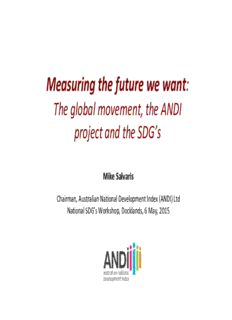
Prof. Mike Salvaris: The Australian National Development Index (ANDI) PDF
Preview Prof. Mike Salvaris: The Australian National Development Index (ANDI)
Measuring the future we want: The global movement, the ANDI project and the SDG’s Mike Salvaris Chairman, Australian National Development Index (ANDI) Ltd National SDG’s Workshop, Docklands, 6 May, 2015 Projects – Community and local government: Surf Coast, Moreland, Vic; Onkaparinga, SA, Waverley NSW; Community Indicators Victoria – Senate Inquiry on National Citizenship Indicators – Tasmania Together – ABS Measures of Australia’s Progress – A Fairer Victoria – The South Australian Strategic Plan – The Canadian Index of Wellbeing – Bhutan GNH – Newfoundland‐Labrador Community Accounts – Bertelsmann Foundation Germany (international best practice review) – THE OECD Global Project/Better Life Indicators – The ANDI Project (Australian National Development Index) What are the issues and why are they important? 1. How we define and measure national progress and our key national goals is crucially important for our present and future wellbeing. 2. GDP, the most influential current measure of national progress, is a poor and misleading measure of national wellbeing and societal progress. 3. We need new measures of progress that reflect true progress – equitable and sustainable wellbeing ‐ in all areas of life important to Australians: not just economic, but social, cultural, environmental and democratic. 4. Defining new progress measures for Australia is a democratic issue and must engage citizens as well as experts and policymakers in a debate about what progress should be. 5. There is at present a worldwide movement to ‘redefine progress’ and Australia is well‐placed to benefit from best practice models like the Canadian Index of Wellbeing and the OECD‐UN’s Measuring the Progress of Societies. 6. The university and research community has an essential role, and a direct responsibility to be engaged, in debating and defining new progress measures for Australia, working with citizens and policymakers, across key disciplines and with international colleagues. st As we move forward into the 21 century, how are we doing? 1. Are we better off or worse off than our parents? 2. Are our communities safer and stronger? 3. Are we healthier and wiser? 4. Are our jobs and livelihoods more secure? 5. Are our air and water cleaner? 6. Are our natural resources healthier? 7. Are we a fairer society? 8. Are we leaving a better Australia for our children? Source: Based on GPI Atlantic, 2003, ‘Economics as if people mattered’. What things matter for national well‐being? (UK, 2011) Of the things that matter to you, which should be reflected in measures of national well‐being? Percent who agree this should be included. Health 86 Crime 54 Economic security 72 Ability to have say on local, national issues 53 Good connections with friends and relatives 71 Personal activities, including volunteering 51 Job satisfaction 68 Cultural activities 47 Present & future conditions of environment 67 Income and wealth 44 Education and training 65 Unpaid caring, i.e. for children, family etc 35 Good relationship with spouse or partner 56 Spirituality or religion 32 Source: UK Office of National Statistics, ‘Findings from the National Wellbeing Debate’, July 2011. Table 4, p 13. Why indicators are powerful (1) Statistical indicators are the structural DNA codes of nations. They reflect a society’s values and goals and become the key drivers of economic and technological choices . (Hazel Henderson) Why indicators are powerful (2) Indicators are powerful. They frame debates, steer planning, affect budgets and motivate action. In an increasingly complex world, the search for indicators must be a continuous one. More and more, the process of choosing our measures of progress must be a collaborative process, drawing on the creativity of the whole community … By convening citizens to consider how to measure their overall well‐ being, the community as a whole is spurred to create new visions of the future, develop new working relationships across all boundaries, and define its assets, problems and opportunities in new ways. (Redefining Progress, 1998) Einstein on what counts Not everything that counts can be counted, and not everything that can be counted, counts. (Albert Einstein) We are ‘mismeasuring’ progress Human advance is conditioned by our conception of progress... It is time to end the mismeasure of human progress by economic growth alone. The paradigm shift in favour of sustainable human development is still in the making. But more and more policy makers in many countries are reaching the unavoidable conclusion that, to be valuable and legitimate, development progress—both nationally and internationally—must be people centred, equitably distributed, and environmentally and socially sustainable. (UNDP, 1996, Human Development Report) Higher GDP does not necessarily mean higher wellbeing: but stronger human rights are more likely to. Overall Human Country GDP wellbeing Rights Sweden 12 1 4 USA 1 14 14 Selected OECD countries, ranked by performance, c. 2000‐ 2007 Source: OECD, Tiffen and Gittins 2004, Salvaris
Description: